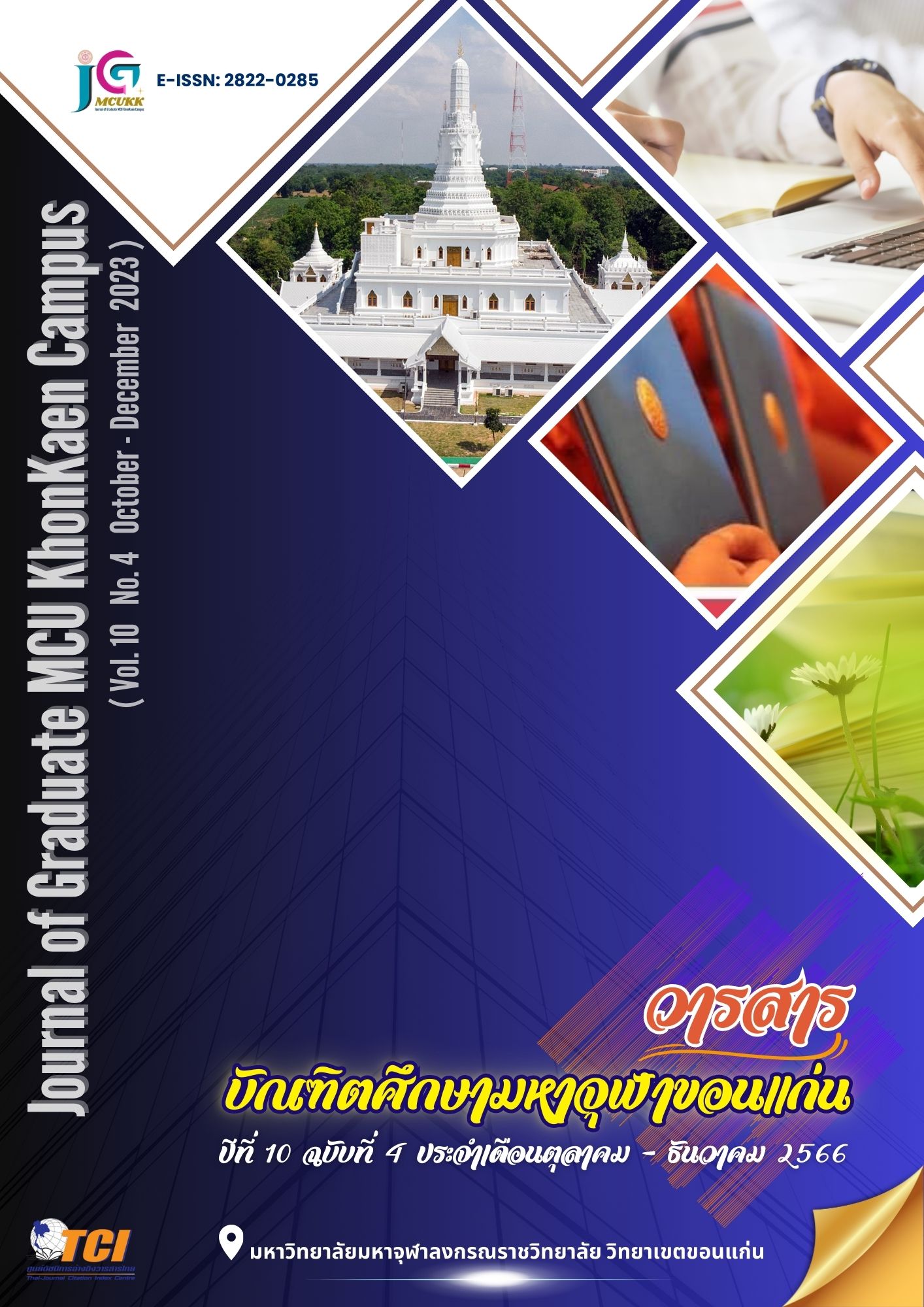Embarking to an Enlightened Leader through the Buddhist Principles
Main Article Content
Abstract
The purpose of this academic article is to present the application of Buddhist concepts to self-improvement for leadership in the context of a changing world. occur at various levels Leaders need to understand and see change as well as accept reality in order to cope and adapt and continue to drive the mission. It is essential to develop an awareness and enlightenment of leadership potential. Effective leadership plays a critical role in determining the success and well-being of organizations, communities and society at large. Therefore, Buddhist concepts have been applied to develop leaders to be leaders with strong minds by using Buddhist principles. by emphasizing on the
principle of Sappurisadhamma For leaders to wake up to be a 'leader with leadership', be able to know the world, know the surroundings and know themselves, which will result in leaders having peace in their hearts and calming. And wisdom is determined to enable work and teams to achieve their objectives while creating a more peaceful and harmonious world.
Article Details

This work is licensed under a Creative Commons Attribution-NonCommercial-NoDerivatives 4.0 International License.
References
ถวิล อรัญเวศ. (2017). การบริหารจัดการตามหลักสัปปุริสธรรม 7. สืบค้นเมื่อ 3 มิถุนายน 2566, จาก https://thawin09.blogspot.com/2017/02/blog-post_12.html
ทัชชกร แสงทองดี. (2562). องค์ประกอบของภาวะผู้นำในองค์กรเชิงพุทธ. วารสารวิจยวิชาการ, 2(1), 135-147.
นครินทร์ วนกิจไพบูลย์. (2023). THE INVIBLE LEADER ผู้นำล่องหน. กรุงเทพฯ: เดอะสแตนดาร์ด.
พรทิพย์ อัยยิมาพันธ์. (2564). บทบาท “ผู้นำ” ยุคโควิด “ต้องสร้างทุกคนให้เป็นผู้บริหาร”. สืบค้นเมื่อ 2 มิถุนายน 2566, จาก https://www.prachachat.net/csr-hr/news-523827
พระทองพจน์ ธีรธมฺโม และคณะ. (2561). หลักสัปปุริสธรรมกับการแก้ไขวิกฤติปัญหาสังคม. วารสารสมาคมศิษย์เก่า มหาวิทยาลัยมหาจุฬาลงกรณราชวิทยาลัย, 6(1), 51-65.
พระธรรมโกศาจารย์ (ประยูร ธมฺมจิตฺโต). (2549). พุทธวิธีบริหาร. กรุงเทพฯ: มหาวิทยาลัยมหาจุฬาลงกรณราชวิทยาลัย.
พระธรรมปิฎก (ป.อ.ปยุตฺโต). (2538). การศึกษาเพื่อสันติภาพ. (พิมพ์ครั้งที่ 2). กรุงเทพฯ: บริษัท สหธรรมิก จำกัด.
พระพรหมคุณาภรณ์ (ป.อ.ปยุตฺโต). (2549). พระพุทธศาสนาพัฒนาคนและสังคม. (พิมพ์ครั้งที่ 6). กรุงเทพฯ: บริษัท สหธรรมิก จำกัด.
ยุติธรรม สินธุ. (2541). แรงจูงใจและรูปแบบการบริหารงาน:ศึกษาเฉพาะกรณีผู้นำระดับต้นในโรงงานผลิตแผ่นเหล็ก. (วิทยานิพนธระดับมหาบัณฑิต). กรุงเทพฯ: มหาวิทยาลัยเกษตรศาสตร์.
ศ.นพ.วันชัย วัฒนศัพท์. (2561). ผู้นำ ผู้นำการเปลี่ยนแปลง. ขอนแก่น: คลังนานาวิทยา.
ศิริวรรณ เสรีรัตน์ และคณะ. (2550). การจัดการและพฤติกรรมองค์การ. กรุงเทพฯ: ธีระฟิล์มและไซเท็กซ์.
สาริสา สัสสินทร. (2558). พุทธจิตวิทยาบูรณาการ : แนวคิด หลักการและการเสริมสร้างภาวะตื่นรู้. (วิิทยานิพนธ์พุทธศาสตร์ดุษฎีบัณฑิต). พระนครศรีอยุธยา: มหาวิทยาลัยมหาจุฬาลงกรณราชวิทยาลัย.
Coghlan, D. (1993). A person-centered approach to dealing with resistance to change. Leadership & Organization Development Journal, 14(4), 10-14.
Naphatsawan Sitthitham. (2021). ผู้นำใครก็เป็นได้ แต่ไม่ใช่ทุกคนจะมีภาวะผู้นำเช็ก 10 ลักษณะของผู้นำที่ดี. สืบคนเมื่อ 3 มิถุนายน 2566, จาก https://missiontothemoon.co/softskill-leadership/
Pattarat. (2020). นิยามผู้นำยุคใหม่ ไม่ใช่คนสั่ง-กำกับควบคุม แต่เป็นคนดึงศักยภาพพนักงาน. สืบค้นเมื่อ 3 มิถุนายน 2566, จาก https://positioningmag.com/1293324
Praornpit Katchwattana. (2022). Climate change – การปรับตัวสู่ดิจิทัล - ความเหลื่อมล้ำ 3 ปัจจัยท้าทายโลกปัจจุบัน ในมุมมอง ศุภชัย เจียรวนนท์. สืบคนเมื่อ 3 มิถุนายน 2566, จาก https://www.salika.co/2022/01/17/suppachai-chearavanont-vision-cp-2565/

